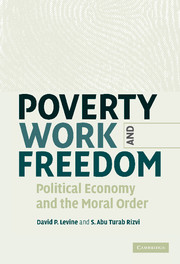4 - Income, basic needs, and capabilities
Published online by Cambridge University Press: 22 September 2009
Summary
The problem of poverty is a central issue in thinking about underdevelopment. A way to organize this thinking is to ask what the different approaches to development see as missing in the lives of the poor. In broad terms, development thought has seen the poor as lacking income, the ability to satisfy basic needs, or the capabilities to lead a fully human life. In this chapter, we consider each of these possibilities in turn.
Growth and income
An emphasis on improving outcomes in developing countries by fostering economic growth can follow from neoclassical economics. The neoclassical approach takes as its building blocks information on preferences, endowments, and technology (Debreu 1959). In order for individual welfare to improve, given that preferences are held fixed by assumption, endowments need to increase or technology needs to develop. The emphasis on technological change is consistent with a focus on industrialization. And the idea of increasing endowments is also consistent with growth. Endowments, namely goods and services that individuals have access to for consumption and production purposes, would increase with growth and are themselves inputs for growth. Some of these services can be productive, such as those provided by labor or capital. From this point of view, we can also see why there might be a specific emphasis on increasing the productivity of labor. Hence, there is a neoclassical emphasis on human capital, the idea that through education and other means, workers will invest in their own productive capacity.
- Type
- Chapter
- Information
- Poverty, Work, and FreedomPolitical Economy and the Moral Order, pp. 41 - 52Publisher: Cambridge University PressPrint publication year: 2005

